Case Study: Using the Trans-theoretical Model for Behaviour Change
VerifiedAdded on 2023/06/13
|10
|2430
|58
Case Study
AI Summary
This case study explores the application of the trans-theoretical model in assisting a 35-year-old male, Ying, to quit smoking. Ying, who has been smoking a pack a day for ten years, seeks professional help to address potential health issues. The paper discusses using the trans-theoretical model, encompassing stages of change, processes of change, self-efficacy, and decisional balance, to guide Ying through the behaviour alteration process. It further examines the role of motivational interviewing in resolving ambivalent feelings and fostering confidence in making life-changing decisions, specifically in the context of addiction treatment. The analysis covers various stages, from precontemplation to maintenance and potential relapse, emphasizing the importance of empathy, practicality, and patient-centered care in the therapeutic approach. The study concludes that integrating the trans-theoretical model with motivational interviewing offers a robust framework for managing addiction and promoting positive health outcomes.
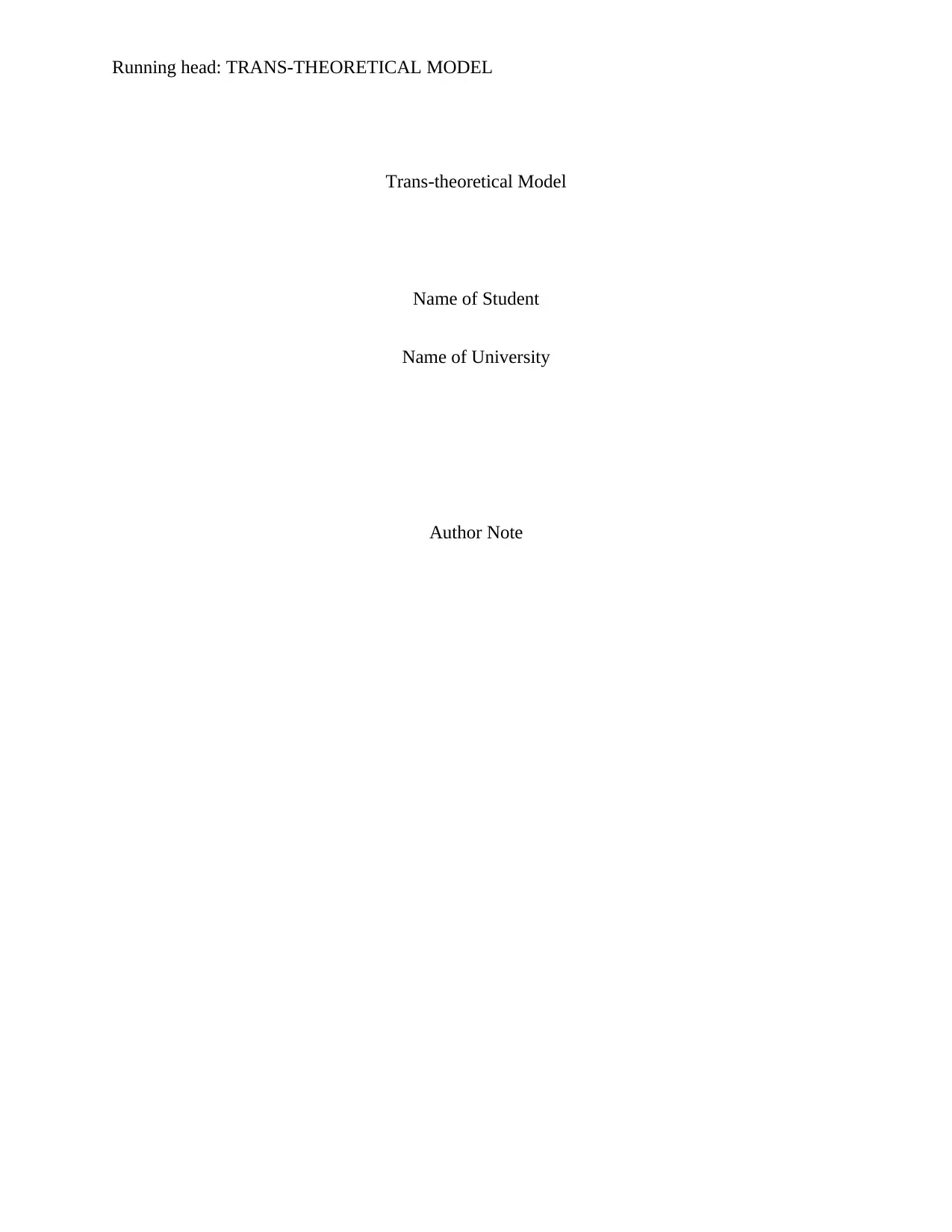
Running head: TRANS-THEORETICAL MODEL
Trans-theoretical Model
Name of Student
Name of University
Author Note
Trans-theoretical Model
Name of Student
Name of University
Author Note
Paraphrase This Document
Need a fresh take? Get an instant paraphrase of this document with our AI Paraphraser
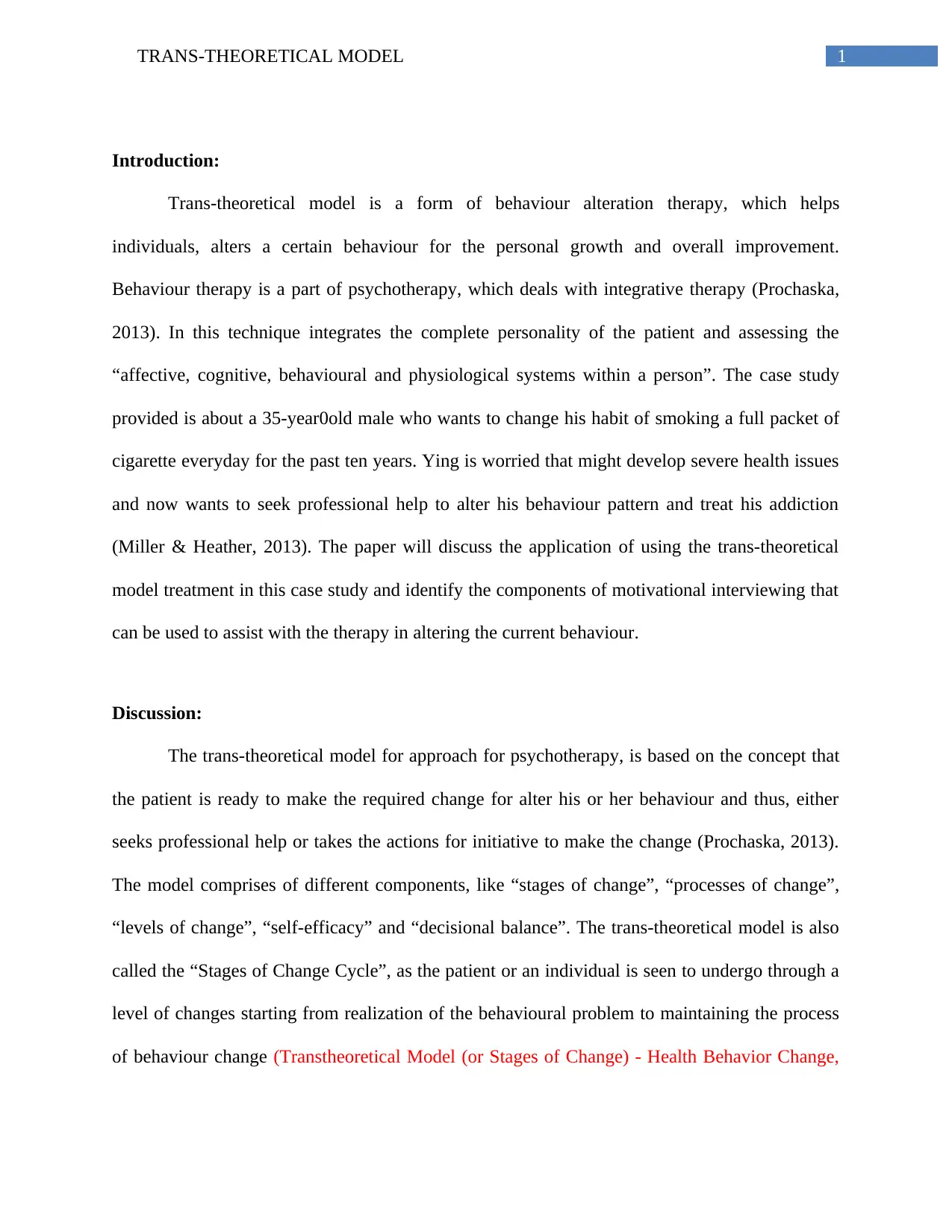
1TRANS-THEORETICAL MODEL
Introduction:
Trans-theoretical model is a form of behaviour alteration therapy, which helps
individuals, alters a certain behaviour for the personal growth and overall improvement.
Behaviour therapy is a part of psychotherapy, which deals with integrative therapy (Prochaska,
2013). In this technique integrates the complete personality of the patient and assessing the
“affective, cognitive, behavioural and physiological systems within a person”. The case study
provided is about a 35-year0old male who wants to change his habit of smoking a full packet of
cigarette everyday for the past ten years. Ying is worried that might develop severe health issues
and now wants to seek professional help to alter his behaviour pattern and treat his addiction
(Miller & Heather, 2013). The paper will discuss the application of using the trans-theoretical
model treatment in this case study and identify the components of motivational interviewing that
can be used to assist with the therapy in altering the current behaviour.
Discussion:
The trans-theoretical model for approach for psychotherapy, is based on the concept that
the patient is ready to make the required change for alter his or her behaviour and thus, either
seeks professional help or takes the actions for initiative to make the change (Prochaska, 2013).
The model comprises of different components, like “stages of change”, “processes of change”,
“levels of change”, “self-efficacy” and “decisional balance”. The trans-theoretical model is also
called the “Stages of Change Cycle”, as the patient or an individual is seen to undergo through a
level of changes starting from realization of the behavioural problem to maintaining the process
of behaviour change (Transtheoretical Model (or Stages of Change) - Health Behavior Change,
Introduction:
Trans-theoretical model is a form of behaviour alteration therapy, which helps
individuals, alters a certain behaviour for the personal growth and overall improvement.
Behaviour therapy is a part of psychotherapy, which deals with integrative therapy (Prochaska,
2013). In this technique integrates the complete personality of the patient and assessing the
“affective, cognitive, behavioural and physiological systems within a person”. The case study
provided is about a 35-year0old male who wants to change his habit of smoking a full packet of
cigarette everyday for the past ten years. Ying is worried that might develop severe health issues
and now wants to seek professional help to alter his behaviour pattern and treat his addiction
(Miller & Heather, 2013). The paper will discuss the application of using the trans-theoretical
model treatment in this case study and identify the components of motivational interviewing that
can be used to assist with the therapy in altering the current behaviour.
Discussion:
The trans-theoretical model for approach for psychotherapy, is based on the concept that
the patient is ready to make the required change for alter his or her behaviour and thus, either
seeks professional help or takes the actions for initiative to make the change (Prochaska, 2013).
The model comprises of different components, like “stages of change”, “processes of change”,
“levels of change”, “self-efficacy” and “decisional balance”. The trans-theoretical model is also
called the “Stages of Change Cycle”, as the patient or an individual is seen to undergo through a
level of changes starting from realization of the behavioural problem to maintaining the process
of behaviour change (Transtheoretical Model (or Stages of Change) - Health Behavior Change,
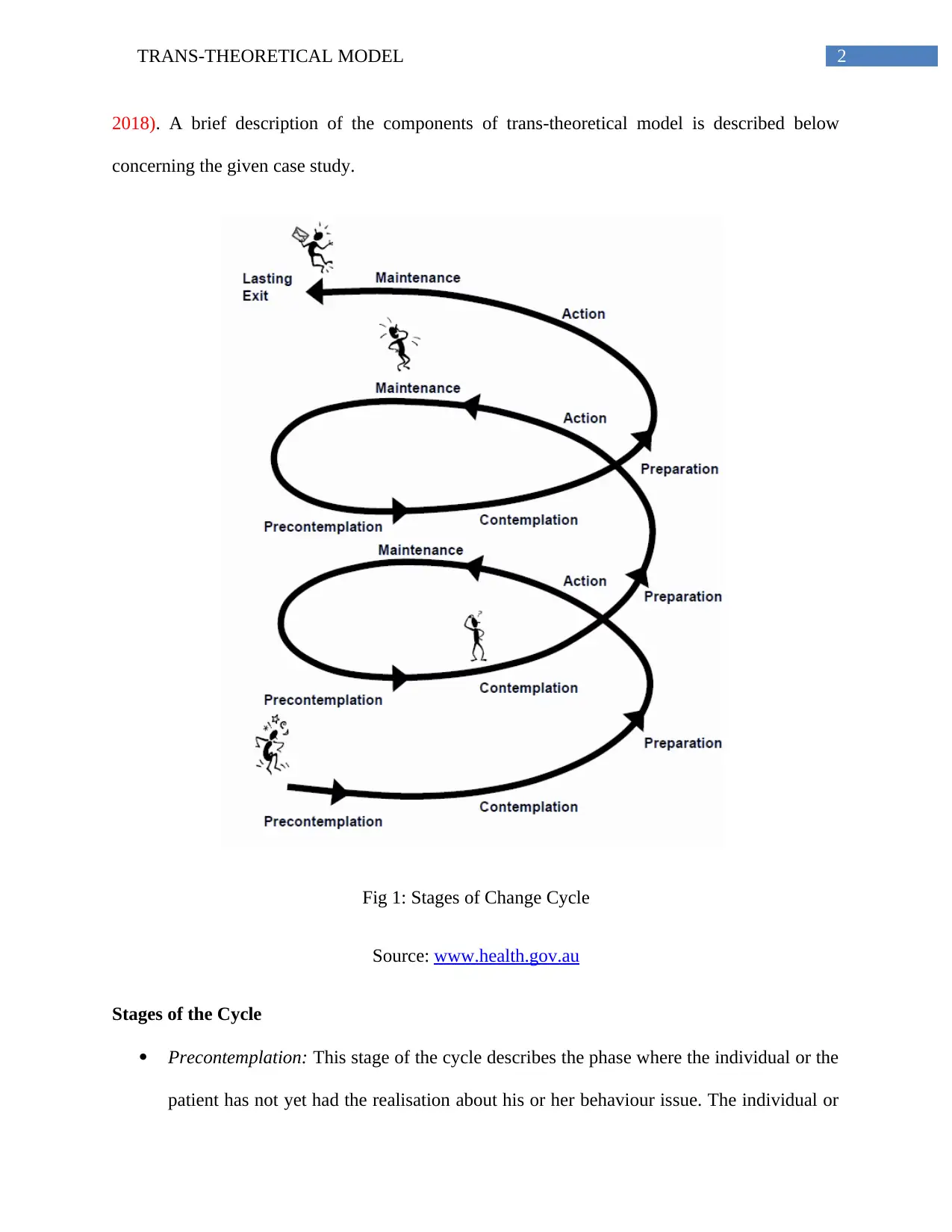
2TRANS-THEORETICAL MODEL
2018). A brief description of the components of trans-theoretical model is described below
concerning the given case study.
Fig 1: Stages of Change Cycle
Source: www.health.gov.au
Stages of the Cycle
Precontemplation: This stage of the cycle describes the phase where the individual or the
patient has not yet had the realisation about his or her behaviour issue. The individual or
2018). A brief description of the components of trans-theoretical model is described below
concerning the given case study.
Fig 1: Stages of Change Cycle
Source: www.health.gov.au
Stages of the Cycle
Precontemplation: This stage of the cycle describes the phase where the individual or the
patient has not yet had the realisation about his or her behaviour issue. The individual or
⊘ This is a preview!⊘
Do you want full access?
Subscribe today to unlock all pages.

Trusted by 1+ million students worldwide
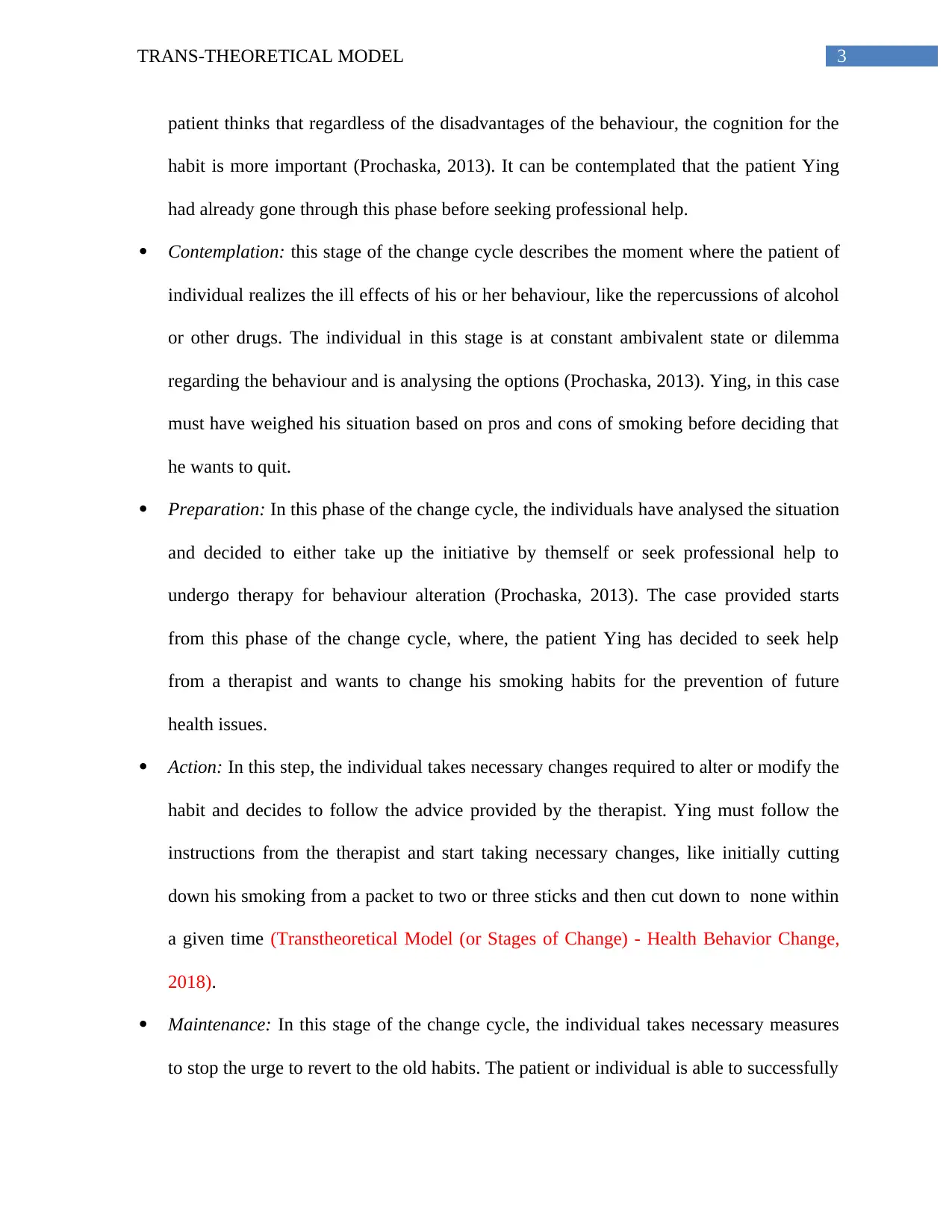
3TRANS-THEORETICAL MODEL
patient thinks that regardless of the disadvantages of the behaviour, the cognition for the
habit is more important (Prochaska, 2013). It can be contemplated that the patient Ying
had already gone through this phase before seeking professional help.
Contemplation: this stage of the change cycle describes the moment where the patient of
individual realizes the ill effects of his or her behaviour, like the repercussions of alcohol
or other drugs. The individual in this stage is at constant ambivalent state or dilemma
regarding the behaviour and is analysing the options (Prochaska, 2013). Ying, in this case
must have weighed his situation based on pros and cons of smoking before deciding that
he wants to quit.
Preparation: In this phase of the change cycle, the individuals have analysed the situation
and decided to either take up the initiative by themself or seek professional help to
undergo therapy for behaviour alteration (Prochaska, 2013). The case provided starts
from this phase of the change cycle, where, the patient Ying has decided to seek help
from a therapist and wants to change his smoking habits for the prevention of future
health issues.
Action: In this step, the individual takes necessary changes required to alter or modify the
habit and decides to follow the advice provided by the therapist. Ying must follow the
instructions from the therapist and start taking necessary changes, like initially cutting
down his smoking from a packet to two or three sticks and then cut down to none within
a given time (Transtheoretical Model (or Stages of Change) - Health Behavior Change,
2018).
Maintenance: In this stage of the change cycle, the individual takes necessary measures
to stop the urge to revert to the old habits. The patient or individual is able to successfully
patient thinks that regardless of the disadvantages of the behaviour, the cognition for the
habit is more important (Prochaska, 2013). It can be contemplated that the patient Ying
had already gone through this phase before seeking professional help.
Contemplation: this stage of the change cycle describes the moment where the patient of
individual realizes the ill effects of his or her behaviour, like the repercussions of alcohol
or other drugs. The individual in this stage is at constant ambivalent state or dilemma
regarding the behaviour and is analysing the options (Prochaska, 2013). Ying, in this case
must have weighed his situation based on pros and cons of smoking before deciding that
he wants to quit.
Preparation: In this phase of the change cycle, the individuals have analysed the situation
and decided to either take up the initiative by themself or seek professional help to
undergo therapy for behaviour alteration (Prochaska, 2013). The case provided starts
from this phase of the change cycle, where, the patient Ying has decided to seek help
from a therapist and wants to change his smoking habits for the prevention of future
health issues.
Action: In this step, the individual takes necessary changes required to alter or modify the
habit and decides to follow the advice provided by the therapist. Ying must follow the
instructions from the therapist and start taking necessary changes, like initially cutting
down his smoking from a packet to two or three sticks and then cut down to none within
a given time (Transtheoretical Model (or Stages of Change) - Health Behavior Change,
2018).
Maintenance: In this stage of the change cycle, the individual takes necessary measures
to stop the urge to revert to the old habits. The patient or individual is able to successfully
Paraphrase This Document
Need a fresh take? Get an instant paraphrase of this document with our AI Paraphraser
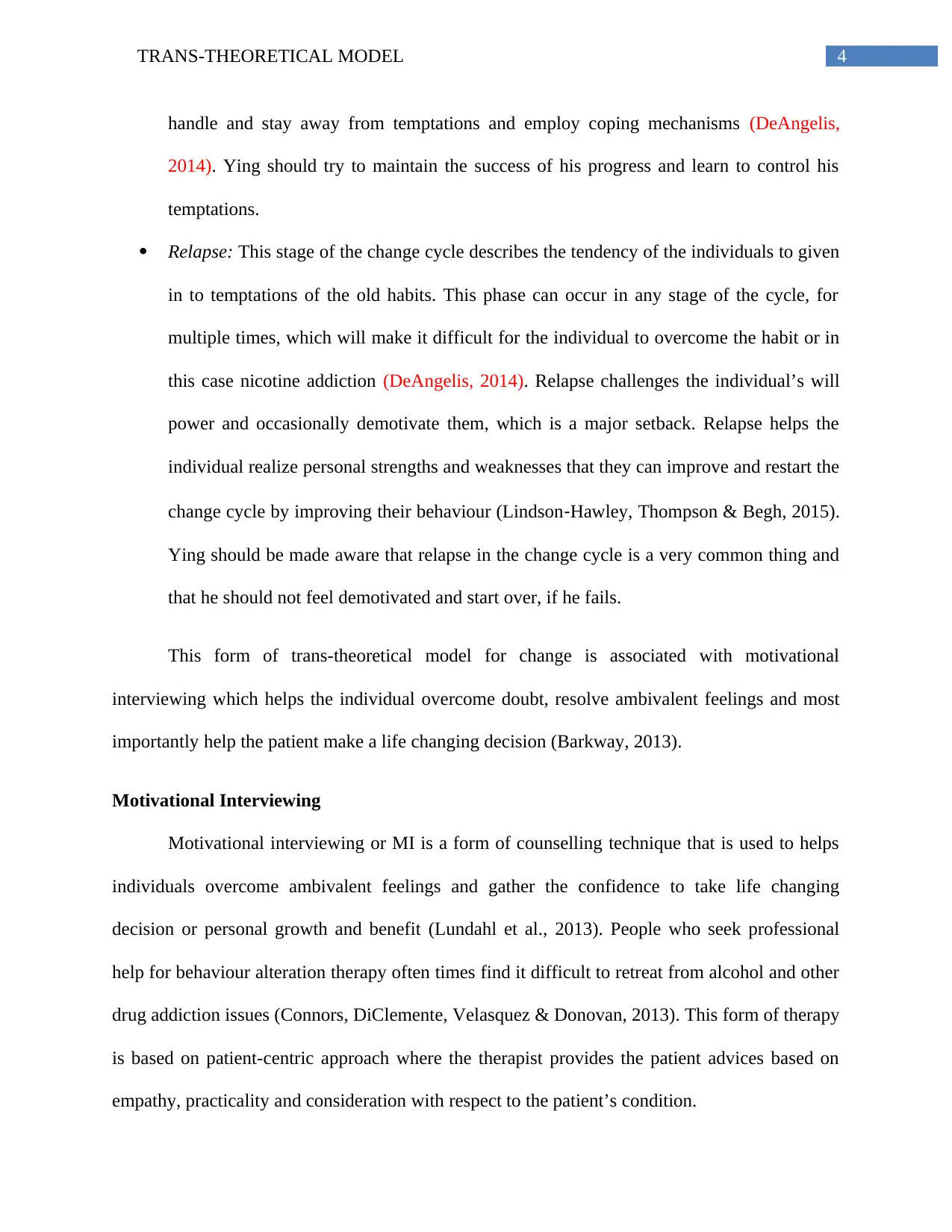
4TRANS-THEORETICAL MODEL
handle and stay away from temptations and employ coping mechanisms (DeAngelis,
2014). Ying should try to maintain the success of his progress and learn to control his
temptations.
Relapse: This stage of the change cycle describes the tendency of the individuals to given
in to temptations of the old habits. This phase can occur in any stage of the cycle, for
multiple times, which will make it difficult for the individual to overcome the habit or in
this case nicotine addiction (DeAngelis, 2014). Relapse challenges the individual’s will
power and occasionally demotivate them, which is a major setback. Relapse helps the
individual realize personal strengths and weaknesses that they can improve and restart the
change cycle by improving their behaviour (Lindson‐Hawley, Thompson & Begh, 2015).
Ying should be made aware that relapse in the change cycle is a very common thing and
that he should not feel demotivated and start over, if he fails.
This form of trans-theoretical model for change is associated with motivational
interviewing which helps the individual overcome doubt, resolve ambivalent feelings and most
importantly help the patient make a life changing decision (Barkway, 2013).
Motivational Interviewing
Motivational interviewing or MI is a form of counselling technique that is used to helps
individuals overcome ambivalent feelings and gather the confidence to take life changing
decision or personal growth and benefit (Lundahl et al., 2013). People who seek professional
help for behaviour alteration therapy often times find it difficult to retreat from alcohol and other
drug addiction issues (Connors, DiClemente, Velasquez & Donovan, 2013). This form of therapy
is based on patient-centric approach where the therapist provides the patient advices based on
empathy, practicality and consideration with respect to the patient’s condition.
handle and stay away from temptations and employ coping mechanisms (DeAngelis,
2014). Ying should try to maintain the success of his progress and learn to control his
temptations.
Relapse: This stage of the change cycle describes the tendency of the individuals to given
in to temptations of the old habits. This phase can occur in any stage of the cycle, for
multiple times, which will make it difficult for the individual to overcome the habit or in
this case nicotine addiction (DeAngelis, 2014). Relapse challenges the individual’s will
power and occasionally demotivate them, which is a major setback. Relapse helps the
individual realize personal strengths and weaknesses that they can improve and restart the
change cycle by improving their behaviour (Lindson‐Hawley, Thompson & Begh, 2015).
Ying should be made aware that relapse in the change cycle is a very common thing and
that he should not feel demotivated and start over, if he fails.
This form of trans-theoretical model for change is associated with motivational
interviewing which helps the individual overcome doubt, resolve ambivalent feelings and most
importantly help the patient make a life changing decision (Barkway, 2013).
Motivational Interviewing
Motivational interviewing or MI is a form of counselling technique that is used to helps
individuals overcome ambivalent feelings and gather the confidence to take life changing
decision or personal growth and benefit (Lundahl et al., 2013). People who seek professional
help for behaviour alteration therapy often times find it difficult to retreat from alcohol and other
drug addiction issues (Connors, DiClemente, Velasquez & Donovan, 2013). This form of therapy
is based on patient-centric approach where the therapist provides the patient advices based on
empathy, practicality and consideration with respect to the patient’s condition.
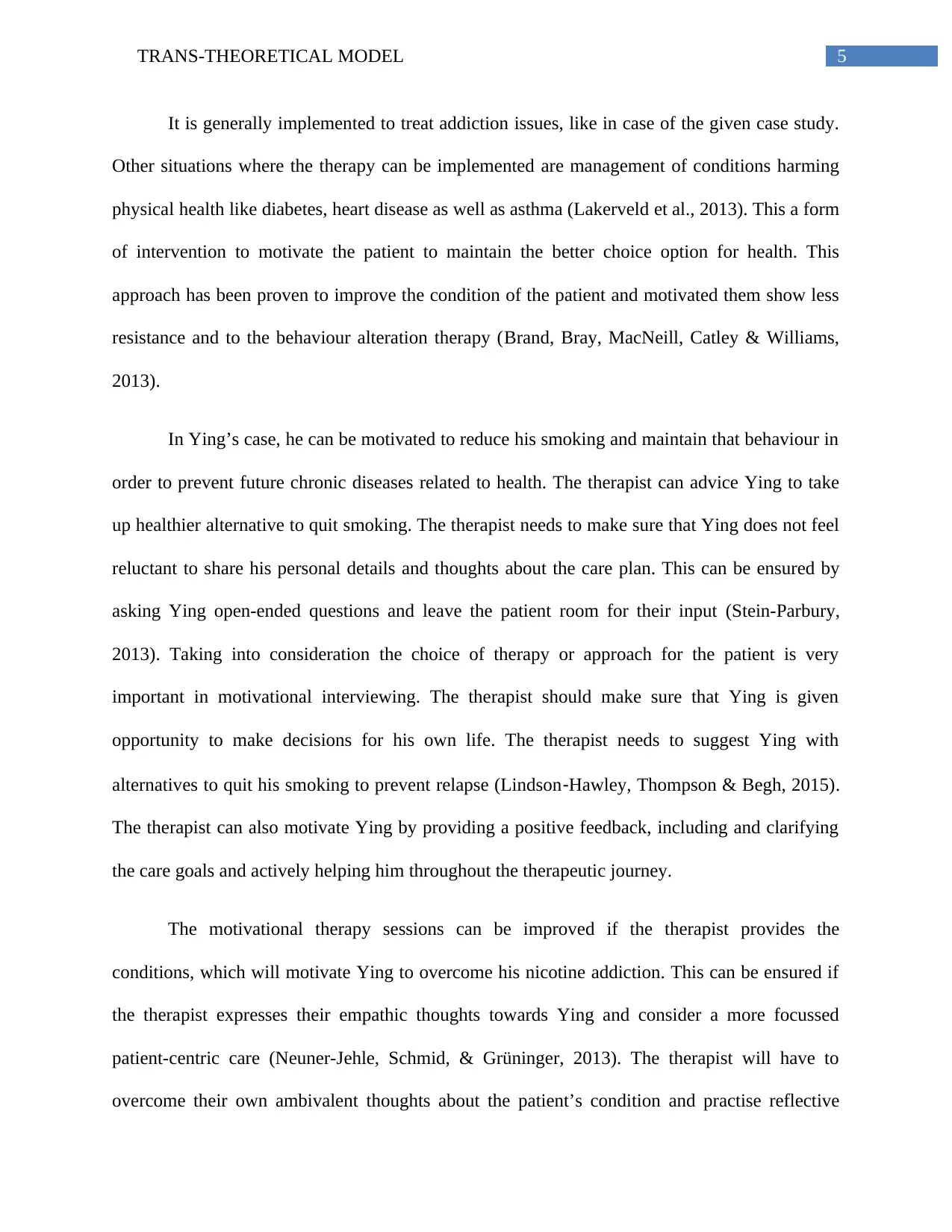
5TRANS-THEORETICAL MODEL
It is generally implemented to treat addiction issues, like in case of the given case study.
Other situations where the therapy can be implemented are management of conditions harming
physical health like diabetes, heart disease as well as asthma (Lakerveld et al., 2013). This a form
of intervention to motivate the patient to maintain the better choice option for health. This
approach has been proven to improve the condition of the patient and motivated them show less
resistance and to the behaviour alteration therapy (Brand, Bray, MacNeill, Catley & Williams,
2013).
In Ying’s case, he can be motivated to reduce his smoking and maintain that behaviour in
order to prevent future chronic diseases related to health. The therapist can advice Ying to take
up healthier alternative to quit smoking. The therapist needs to make sure that Ying does not feel
reluctant to share his personal details and thoughts about the care plan. This can be ensured by
asking Ying open-ended questions and leave the patient room for their input (Stein-Parbury,
2013). Taking into consideration the choice of therapy or approach for the patient is very
important in motivational interviewing. The therapist should make sure that Ying is given
opportunity to make decisions for his own life. The therapist needs to suggest Ying with
alternatives to quit his smoking to prevent relapse (Lindson‐Hawley, Thompson & Begh, 2015).
The therapist can also motivate Ying by providing a positive feedback, including and clarifying
the care goals and actively helping him throughout the therapeutic journey.
The motivational therapy sessions can be improved if the therapist provides the
conditions, which will motivate Ying to overcome his nicotine addiction. This can be ensured if
the therapist expresses their empathic thoughts towards Ying and consider a more focussed
patient-centric care (Neuner-Jehle, Schmid, & Grüninger, 2013). The therapist will have to
overcome their own ambivalent thoughts about the patient’s condition and practise reflective
It is generally implemented to treat addiction issues, like in case of the given case study.
Other situations where the therapy can be implemented are management of conditions harming
physical health like diabetes, heart disease as well as asthma (Lakerveld et al., 2013). This a form
of intervention to motivate the patient to maintain the better choice option for health. This
approach has been proven to improve the condition of the patient and motivated them show less
resistance and to the behaviour alteration therapy (Brand, Bray, MacNeill, Catley & Williams,
2013).
In Ying’s case, he can be motivated to reduce his smoking and maintain that behaviour in
order to prevent future chronic diseases related to health. The therapist can advice Ying to take
up healthier alternative to quit smoking. The therapist needs to make sure that Ying does not feel
reluctant to share his personal details and thoughts about the care plan. This can be ensured by
asking Ying open-ended questions and leave the patient room for their input (Stein-Parbury,
2013). Taking into consideration the choice of therapy or approach for the patient is very
important in motivational interviewing. The therapist should make sure that Ying is given
opportunity to make decisions for his own life. The therapist needs to suggest Ying with
alternatives to quit his smoking to prevent relapse (Lindson‐Hawley, Thompson & Begh, 2015).
The therapist can also motivate Ying by providing a positive feedback, including and clarifying
the care goals and actively helping him throughout the therapeutic journey.
The motivational therapy sessions can be improved if the therapist provides the
conditions, which will motivate Ying to overcome his nicotine addiction. This can be ensured if
the therapist expresses their empathic thoughts towards Ying and consider a more focussed
patient-centric care (Neuner-Jehle, Schmid, & Grüninger, 2013). The therapist will have to
overcome their own ambivalent thoughts about the patient’s condition and practise reflective
⊘ This is a preview!⊘
Do you want full access?
Subscribe today to unlock all pages.

Trusted by 1+ million students worldwide
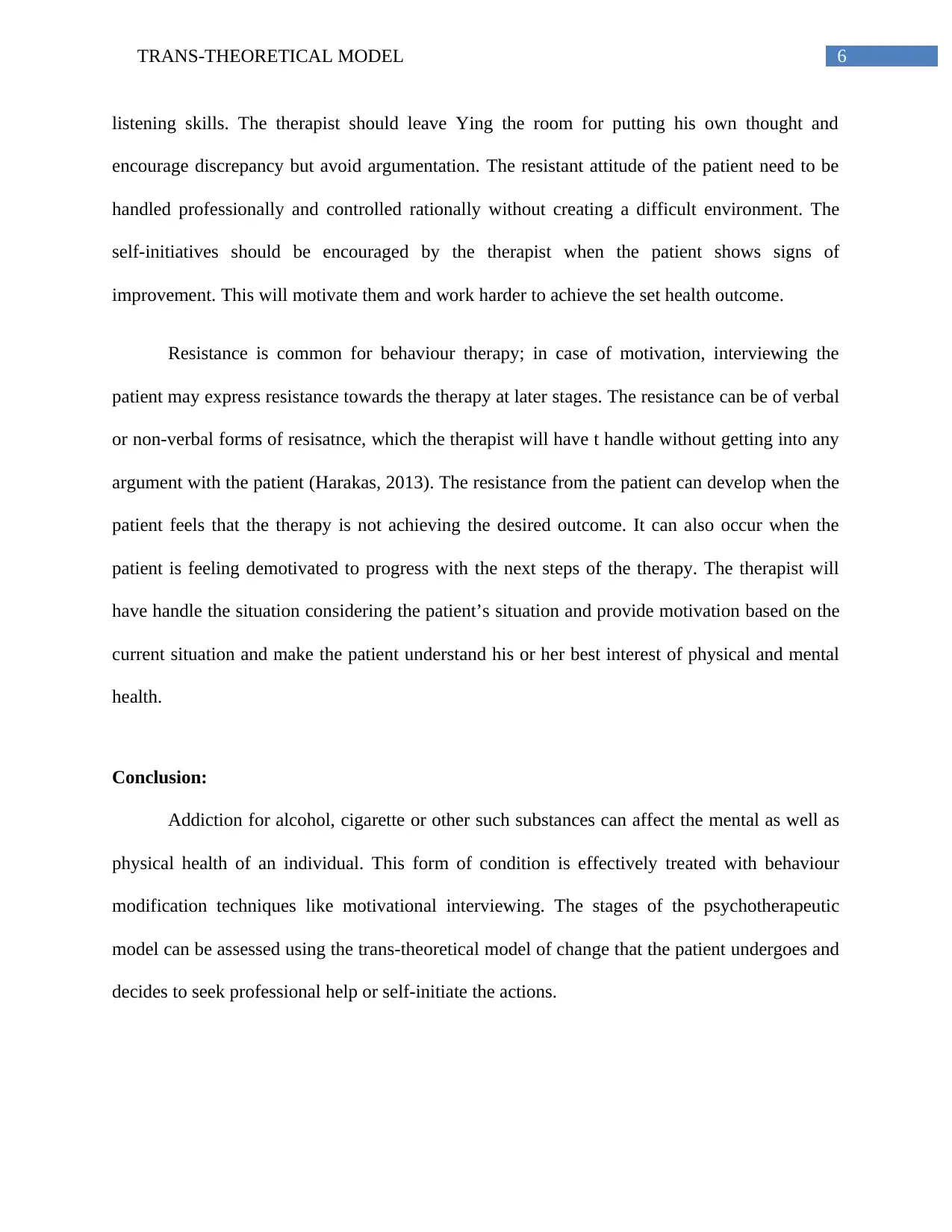
6TRANS-THEORETICAL MODEL
listening skills. The therapist should leave Ying the room for putting his own thought and
encourage discrepancy but avoid argumentation. The resistant attitude of the patient need to be
handled professionally and controlled rationally without creating a difficult environment. The
self-initiatives should be encouraged by the therapist when the patient shows signs of
improvement. This will motivate them and work harder to achieve the set health outcome.
Resistance is common for behaviour therapy; in case of motivation, interviewing the
patient may express resistance towards the therapy at later stages. The resistance can be of verbal
or non-verbal forms of resisatnce, which the therapist will have t handle without getting into any
argument with the patient (Harakas, 2013). The resistance from the patient can develop when the
patient feels that the therapy is not achieving the desired outcome. It can also occur when the
patient is feeling demotivated to progress with the next steps of the therapy. The therapist will
have handle the situation considering the patient’s situation and provide motivation based on the
current situation and make the patient understand his or her best interest of physical and mental
health.
Conclusion:
Addiction for alcohol, cigarette or other such substances can affect the mental as well as
physical health of an individual. This form of condition is effectively treated with behaviour
modification techniques like motivational interviewing. The stages of the psychotherapeutic
model can be assessed using the trans-theoretical model of change that the patient undergoes and
decides to seek professional help or self-initiate the actions.
listening skills. The therapist should leave Ying the room for putting his own thought and
encourage discrepancy but avoid argumentation. The resistant attitude of the patient need to be
handled professionally and controlled rationally without creating a difficult environment. The
self-initiatives should be encouraged by the therapist when the patient shows signs of
improvement. This will motivate them and work harder to achieve the set health outcome.
Resistance is common for behaviour therapy; in case of motivation, interviewing the
patient may express resistance towards the therapy at later stages. The resistance can be of verbal
or non-verbal forms of resisatnce, which the therapist will have t handle without getting into any
argument with the patient (Harakas, 2013). The resistance from the patient can develop when the
patient feels that the therapy is not achieving the desired outcome. It can also occur when the
patient is feeling demotivated to progress with the next steps of the therapy. The therapist will
have handle the situation considering the patient’s situation and provide motivation based on the
current situation and make the patient understand his or her best interest of physical and mental
health.
Conclusion:
Addiction for alcohol, cigarette or other such substances can affect the mental as well as
physical health of an individual. This form of condition is effectively treated with behaviour
modification techniques like motivational interviewing. The stages of the psychotherapeutic
model can be assessed using the trans-theoretical model of change that the patient undergoes and
decides to seek professional help or self-initiate the actions.
Paraphrase This Document
Need a fresh take? Get an instant paraphrase of this document with our AI Paraphraser
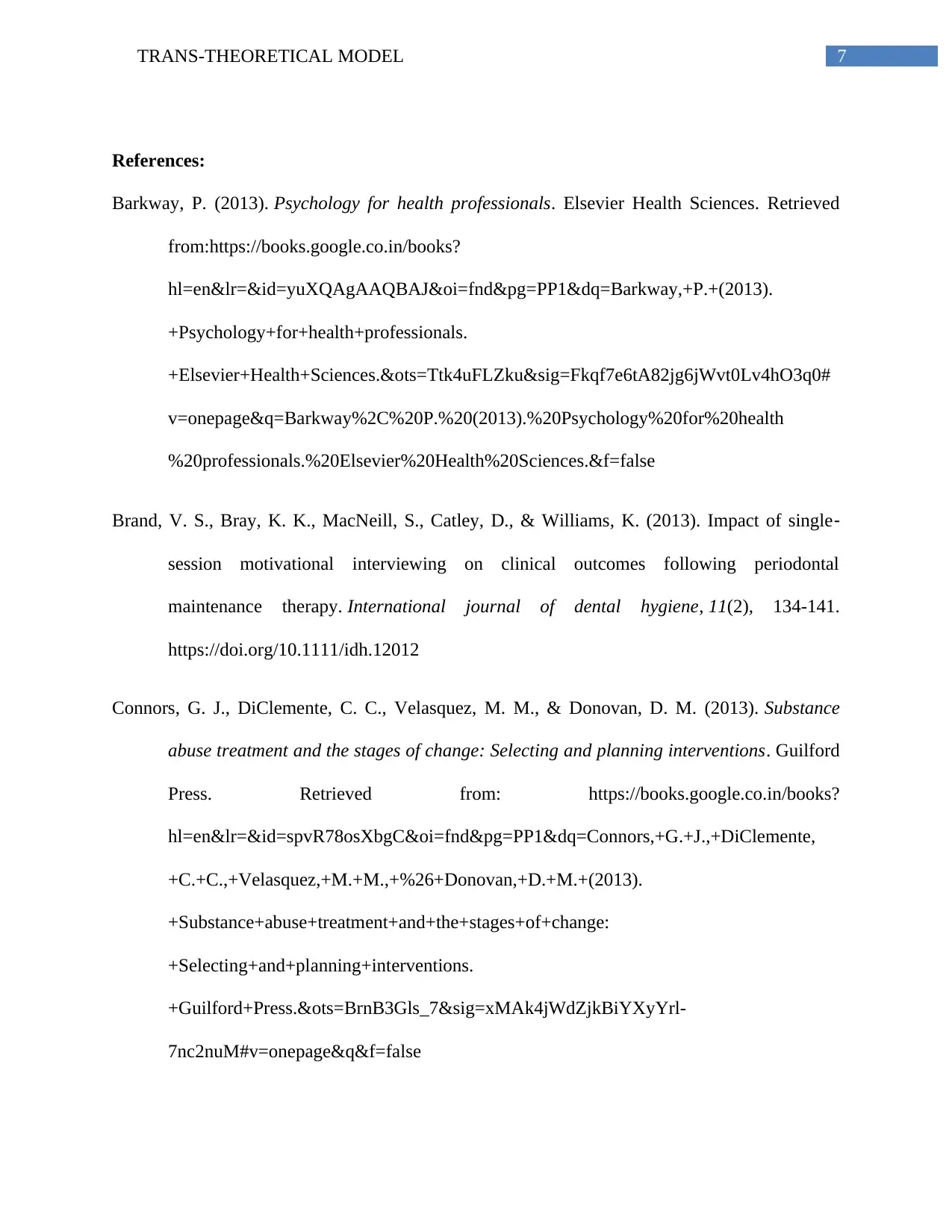
7TRANS-THEORETICAL MODEL
References:
Barkway, P. (2013). Psychology for health professionals. Elsevier Health Sciences. Retrieved
from:https://books.google.co.in/books?
hl=en&lr=&id=yuXQAgAAQBAJ&oi=fnd&pg=PP1&dq=Barkway,+P.+(2013).
+Psychology+for+health+professionals.
+Elsevier+Health+Sciences.&ots=Ttk4uFLZku&sig=Fkqf7e6tA82jg6jWvt0Lv4hO3q0#
v=onepage&q=Barkway%2C%20P.%20(2013).%20Psychology%20for%20health
%20professionals.%20Elsevier%20Health%20Sciences.&f=false
Brand, V. S., Bray, K. K., MacNeill, S., Catley, D., & Williams, K. (2013). Impact of single‐
session motivational interviewing on clinical outcomes following periodontal
maintenance therapy. International journal of dental hygiene, 11(2), 134-141.
https://doi.org/10.1111/idh.12012
Connors, G. J., DiClemente, C. C., Velasquez, M. M., & Donovan, D. M. (2013). Substance
abuse treatment and the stages of change: Selecting and planning interventions. Guilford
Press. Retrieved from: https://books.google.co.in/books?
hl=en&lr=&id=spvR78osXbgC&oi=fnd&pg=PP1&dq=Connors,+G.+J.,+DiClemente,
+C.+C.,+Velasquez,+M.+M.,+%26+Donovan,+D.+M.+(2013).
+Substance+abuse+treatment+and+the+stages+of+change:
+Selecting+and+planning+interventions.
+Guilford+Press.&ots=BrnB3Gls_7&sig=xMAk4jWdZjkBiYXyYrl-
7nc2nuM#v=onepage&q&f=false
References:
Barkway, P. (2013). Psychology for health professionals. Elsevier Health Sciences. Retrieved
from:https://books.google.co.in/books?
hl=en&lr=&id=yuXQAgAAQBAJ&oi=fnd&pg=PP1&dq=Barkway,+P.+(2013).
+Psychology+for+health+professionals.
+Elsevier+Health+Sciences.&ots=Ttk4uFLZku&sig=Fkqf7e6tA82jg6jWvt0Lv4hO3q0#
v=onepage&q=Barkway%2C%20P.%20(2013).%20Psychology%20for%20health
%20professionals.%20Elsevier%20Health%20Sciences.&f=false
Brand, V. S., Bray, K. K., MacNeill, S., Catley, D., & Williams, K. (2013). Impact of single‐
session motivational interviewing on clinical outcomes following periodontal
maintenance therapy. International journal of dental hygiene, 11(2), 134-141.
https://doi.org/10.1111/idh.12012
Connors, G. J., DiClemente, C. C., Velasquez, M. M., & Donovan, D. M. (2013). Substance
abuse treatment and the stages of change: Selecting and planning interventions. Guilford
Press. Retrieved from: https://books.google.co.in/books?
hl=en&lr=&id=spvR78osXbgC&oi=fnd&pg=PP1&dq=Connors,+G.+J.,+DiClemente,
+C.+C.,+Velasquez,+M.+M.,+%26+Donovan,+D.+M.+(2013).
+Substance+abuse+treatment+and+the+stages+of+change:
+Selecting+and+planning+interventions.
+Guilford+Press.&ots=BrnB3Gls_7&sig=xMAk4jWdZjkBiYXyYrl-
7nc2nuM#v=onepage&q&f=false
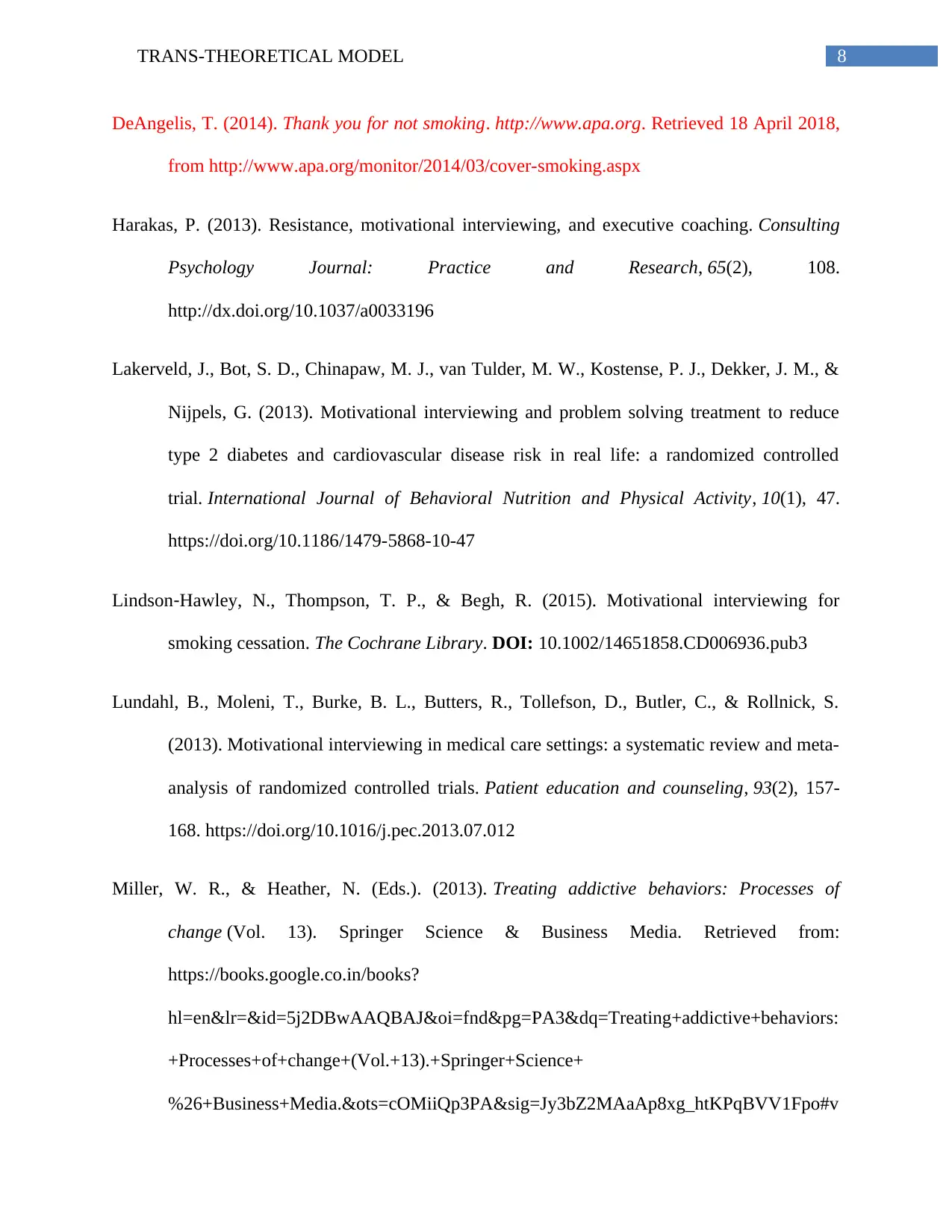
8TRANS-THEORETICAL MODEL
DeAngelis, T. (2014). Thank you for not smoking. http://www.apa.org. Retrieved 18 April 2018,
from http://www.apa.org/monitor/2014/03/cover-smoking.aspx
Harakas, P. (2013). Resistance, motivational interviewing, and executive coaching. Consulting
Psychology Journal: Practice and Research, 65(2), 108.
http://dx.doi.org/10.1037/a0033196
Lakerveld, J., Bot, S. D., Chinapaw, M. J., van Tulder, M. W., Kostense, P. J., Dekker, J. M., &
Nijpels, G. (2013). Motivational interviewing and problem solving treatment to reduce
type 2 diabetes and cardiovascular disease risk in real life: a randomized controlled
trial. International Journal of Behavioral Nutrition and Physical Activity, 10(1), 47.
https://doi.org/10.1186/1479-5868-10-47
Lindson‐Hawley, N., Thompson, T. P., & Begh, R. (2015). Motivational interviewing for
smoking cessation. The Cochrane Library. DOI: 10.1002/14651858.CD006936.pub3
Lundahl, B., Moleni, T., Burke, B. L., Butters, R., Tollefson, D., Butler, C., & Rollnick, S.
(2013). Motivational interviewing in medical care settings: a systematic review and meta-
analysis of randomized controlled trials. Patient education and counseling, 93(2), 157-
168. https://doi.org/10.1016/j.pec.2013.07.012
Miller, W. R., & Heather, N. (Eds.). (2013). Treating addictive behaviors: Processes of
change (Vol. 13). Springer Science & Business Media. Retrieved from:
https://books.google.co.in/books?
hl=en&lr=&id=5j2DBwAAQBAJ&oi=fnd&pg=PA3&dq=Treating+addictive+behaviors:
+Processes+of+change+(Vol.+13).+Springer+Science+
%26+Business+Media.&ots=cOMiiQp3PA&sig=Jy3bZ2MAaAp8xg_htKPqBVV1Fpo#v
DeAngelis, T. (2014). Thank you for not smoking. http://www.apa.org. Retrieved 18 April 2018,
from http://www.apa.org/monitor/2014/03/cover-smoking.aspx
Harakas, P. (2013). Resistance, motivational interviewing, and executive coaching. Consulting
Psychology Journal: Practice and Research, 65(2), 108.
http://dx.doi.org/10.1037/a0033196
Lakerveld, J., Bot, S. D., Chinapaw, M. J., van Tulder, M. W., Kostense, P. J., Dekker, J. M., &
Nijpels, G. (2013). Motivational interviewing and problem solving treatment to reduce
type 2 diabetes and cardiovascular disease risk in real life: a randomized controlled
trial. International Journal of Behavioral Nutrition and Physical Activity, 10(1), 47.
https://doi.org/10.1186/1479-5868-10-47
Lindson‐Hawley, N., Thompson, T. P., & Begh, R. (2015). Motivational interviewing for
smoking cessation. The Cochrane Library. DOI: 10.1002/14651858.CD006936.pub3
Lundahl, B., Moleni, T., Burke, B. L., Butters, R., Tollefson, D., Butler, C., & Rollnick, S.
(2013). Motivational interviewing in medical care settings: a systematic review and meta-
analysis of randomized controlled trials. Patient education and counseling, 93(2), 157-
168. https://doi.org/10.1016/j.pec.2013.07.012
Miller, W. R., & Heather, N. (Eds.). (2013). Treating addictive behaviors: Processes of
change (Vol. 13). Springer Science & Business Media. Retrieved from:
https://books.google.co.in/books?
hl=en&lr=&id=5j2DBwAAQBAJ&oi=fnd&pg=PA3&dq=Treating+addictive+behaviors:
+Processes+of+change+(Vol.+13).+Springer+Science+
%26+Business+Media.&ots=cOMiiQp3PA&sig=Jy3bZ2MAaAp8xg_htKPqBVV1Fpo#v
⊘ This is a preview!⊘
Do you want full access?
Subscribe today to unlock all pages.

Trusted by 1+ million students worldwide
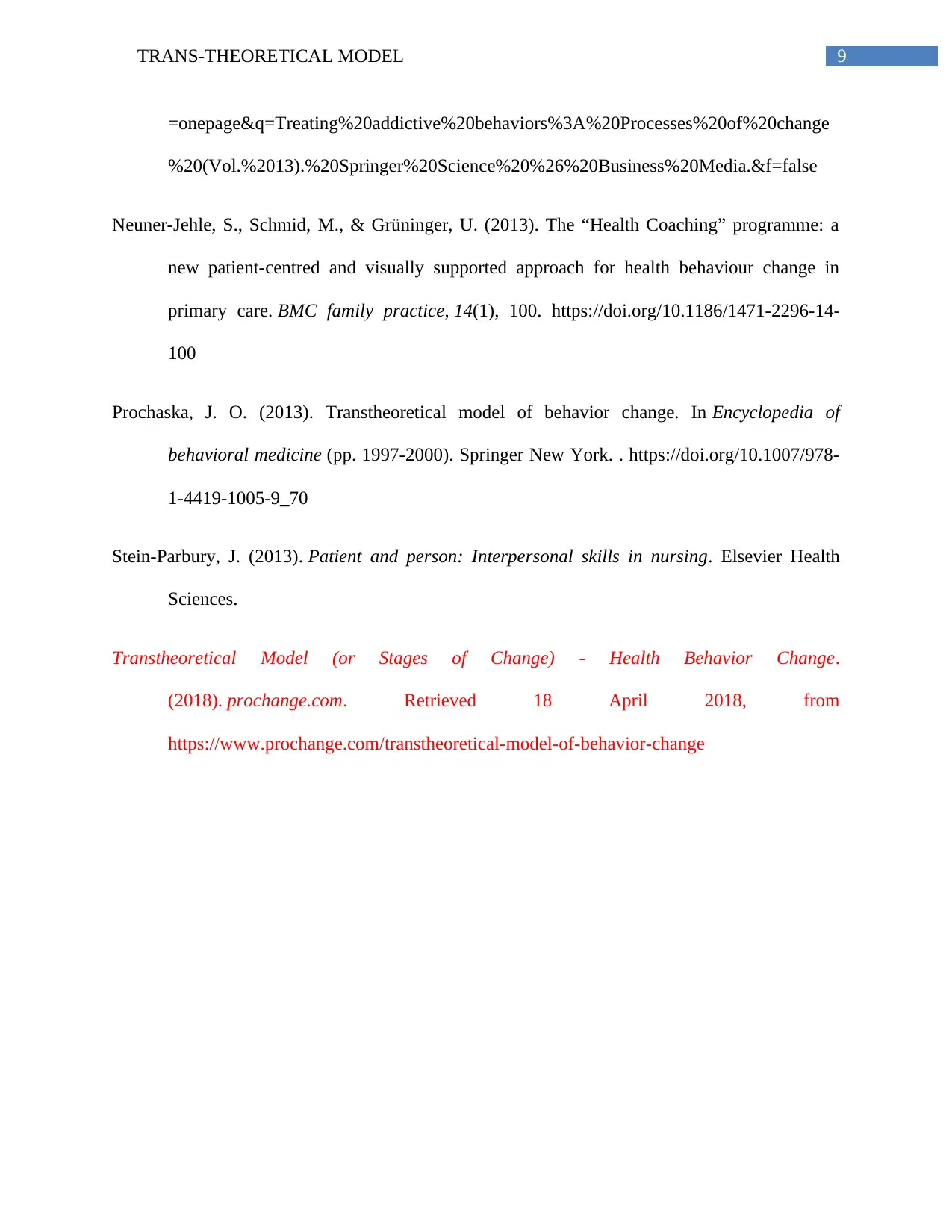
9TRANS-THEORETICAL MODEL
=onepage&q=Treating%20addictive%20behaviors%3A%20Processes%20of%20change
%20(Vol.%2013).%20Springer%20Science%20%26%20Business%20Media.&f=false
Neuner-Jehle, S., Schmid, M., & Grüninger, U. (2013). The “Health Coaching” programme: a
new patient-centred and visually supported approach for health behaviour change in
primary care. BMC family practice, 14(1), 100. https://doi.org/10.1186/1471-2296-14-
100
Prochaska, J. O. (2013). Transtheoretical model of behavior change. In Encyclopedia of
behavioral medicine (pp. 1997-2000). Springer New York. . https://doi.org/10.1007/978-
1-4419-1005-9_70
Stein-Parbury, J. (2013). Patient and person: Interpersonal skills in nursing. Elsevier Health
Sciences.
Transtheoretical Model (or Stages of Change) - Health Behavior Change.
(2018). prochange.com. Retrieved 18 April 2018, from
https://www.prochange.com/transtheoretical-model-of-behavior-change
=onepage&q=Treating%20addictive%20behaviors%3A%20Processes%20of%20change
%20(Vol.%2013).%20Springer%20Science%20%26%20Business%20Media.&f=false
Neuner-Jehle, S., Schmid, M., & Grüninger, U. (2013). The “Health Coaching” programme: a
new patient-centred and visually supported approach for health behaviour change in
primary care. BMC family practice, 14(1), 100. https://doi.org/10.1186/1471-2296-14-
100
Prochaska, J. O. (2013). Transtheoretical model of behavior change. In Encyclopedia of
behavioral medicine (pp. 1997-2000). Springer New York. . https://doi.org/10.1007/978-
1-4419-1005-9_70
Stein-Parbury, J. (2013). Patient and person: Interpersonal skills in nursing. Elsevier Health
Sciences.
Transtheoretical Model (or Stages of Change) - Health Behavior Change.
(2018). prochange.com. Retrieved 18 April 2018, from
https://www.prochange.com/transtheoretical-model-of-behavior-change
1 out of 10
Related Documents
Your All-in-One AI-Powered Toolkit for Academic Success.
+13062052269
info@desklib.com
Available 24*7 on WhatsApp / Email
![[object Object]](/_next/static/media/star-bottom.7253800d.svg)
Unlock your academic potential
Copyright © 2020–2025 A2Z Services. All Rights Reserved. Developed and managed by ZUCOL.




